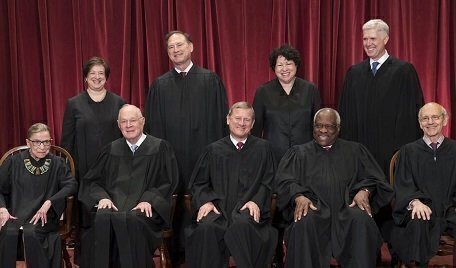The Supreme Court wrapped up decisions in its current term last week, but legal watchers are already talking about a potential landmark term starting in October.
 The Justices ended arguments on June 26 with a significant decision about church-state relations in the Trinity Lutheran case and they issued a surprise per curium opinion about the Trump immigration bans. However, the term lacked the number of high-profile cases seen in recent years.
The Justices ended arguments on June 26 with a significant decision about church-state relations in the Trinity Lutheran case and they issued a surprise per curium opinion about the Trump immigration bans. However, the term lacked the number of high-profile cases seen in recent years.
That doesn’t appear to be the case for the Court’s next term, which starts in full on the first Monday in October.
Here is a quick look at some noteworthy cases that Justices will consider sometime in the term, which runs from October 2017 through June 2018.
1. The Trump immigration ban cases. Although the Court allowed the temporary bans to go into effect for immigrants from six Muslim-majority nations and refugees without a bone fide relationship to the United States, arguments are scheduled to be heard in Trump v. International Refugee Assistance Project as soon as October. Along with a constitutional issue involving the First Amendment, the Justice will consider if the case is already moot due to an alleged June 14 deadline in the revised executive order issued by the President.
2. Cell-phone data locations. In Carpenter v. United States, the Court will consider if the warrantless seizure and search of historical cell-phone records, which show the location and movements of a cell-phone user over a period of more than four months, is permitted by the Fourth Amendment.
3. New Jersey pro sports betting. In Christie v. National Collegiate Athletic Association, the question at arguments will be if a federal law that limits sports betting in New Jersey violates the 10th Amendment’s anti-commandeering clause. The Court accepted the case despite appeals from the Trump Justice Department to deny the case.
4. Partisan gerrymandering. In Gill v. Whitford, the Court faces a potential landmark decision on the subject of redrawing political districts to benefit candidates from a political party. The Court will look at Wisconsin’s appeal of a ruling that struck down a redistricting map created after the 2010 census. The issue to watch: Can the Court devise a formula to reduce or eliminate partisan gerrymandering?
5. The wedding cake case. Another potential significant case is Masterpiece Cakeshop, Ltd. v. Colorado Civil Rights Commission, where the Justices will decide if Colorado's public accommodations law violated the First Amendment religious rights of a cake maker who declined to make a cake for a same-sex marriage event.
6. Voter registration lists. In Husted v. A. Philip Randolph Institute, the Court will look at an apparent conflict between federal voting statutes and state-based programs to maintain voter registration lists. Ohio's program removes voters from its list of registered voters if they don't respond to a notification after four years and vote again. Critics say federal law prevents states from removing people from voter registration rolls for not voting.
To be sure other cases will be added to the Court’s docket, including a batch right before the first session in October. But the current case of merits cases scheduled for the following year will draw a lot of attention, especially with a full court expected to hear arguments.
Scott Bomboy is the editor in chief of the National Constitution Center.







